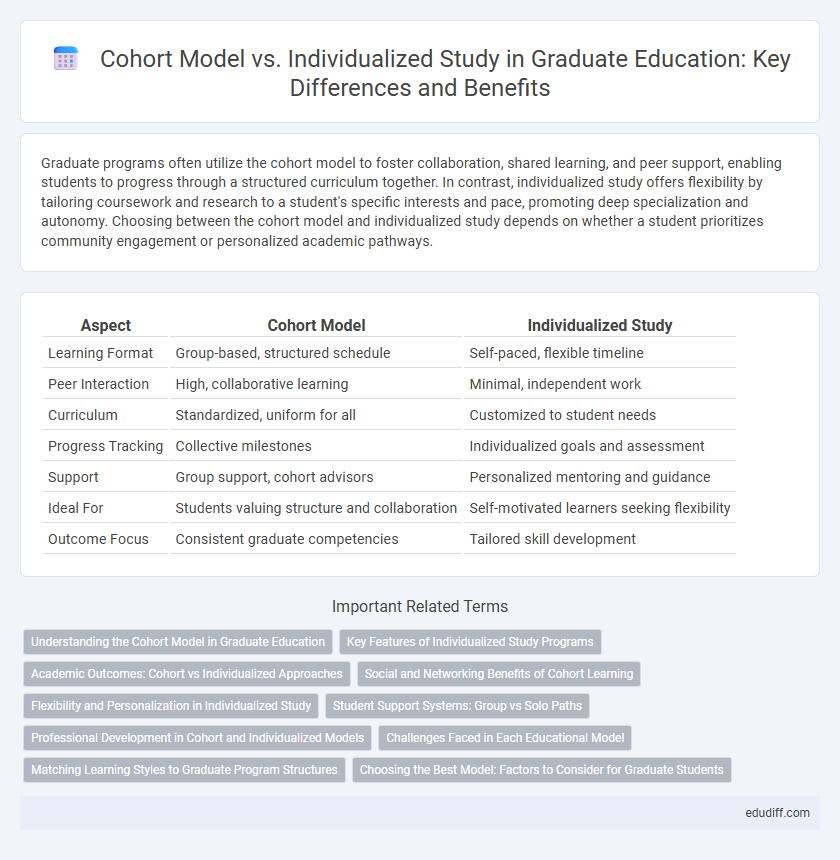Graduate programs often utilize the cohort model to foster collaboration, shared learning, and peer support, enabling students to progress through a structured curriculum together. In contrast, individualized study offers flexibility by tailoring coursework and research to a student's specific interests and pace, promoting deep specialization and autonomy. Choosing between the cohort model and individualized study depends on whether a student prioritizes community engagement or personalized academic pathways.
Table of Comparison
| Aspect | Cohort Model | Individualized Study |
|---|---|---|
| Learning Format | Group-based, structured schedule | Self-paced, flexible timeline |
| Peer Interaction | High, collaborative learning | Minimal, independent work |
| Curriculum | Standardized, uniform for all | Customized to student needs |
| Progress Tracking | Collective milestones | Individualized goals and assessment |
| Support | Group support, cohort advisors | Personalized mentoring and guidance |
| Ideal For | Students valuing structure and collaboration | Self-motivated learners seeking flexibility |
| Outcome Focus | Consistent graduate competencies | Tailored skill development |
Understanding the Cohort Model in Graduate Education
The cohort model in graduate education fosters collaborative learning by grouping students who progress through a program together, enhancing peer support and shared academic experiences. This model promotes deeper engagement with course material through collective discussions and group projects, which can improve critical thinking and professional networking. Research indicates that cohort-based programs often lead to higher retention rates and greater student satisfaction compared to individualized study approaches.
Key Features of Individualized Study Programs
Individualized study programs offer flexible course selection tailored to a graduate student's unique academic interests and career goals, enabling personalized curriculum design beyond standard cohort timelines. These programs emphasize self-directed learning, allowing students to work closely with faculty advisors to create interdisciplinary projects and research opportunities that align with their professional aspirations. Access to customizable mentorship and adaptable pacing helps optimize skill development and knowledge acquisition in specialized fields.
Academic Outcomes: Cohort vs Individualized Approaches
Cohort model programs foster peer collaboration, enhancing critical thinking and communication skills, which often lead to higher retention and graduation rates. Individualized study offers personalized learning paths that cater to specific academic strengths and weaknesses, improving mastery of subject matter and self-paced progression. Comparative studies show cohort approaches excel in standardized assessments, while individualized models better support diverse learning styles and unique academic goals.
Social and Networking Benefits of Cohort Learning
Cohort learning fosters strong social connections and collaborative networks by grouping graduate students with shared academic goals, enhancing peer support and professional opportunities. This model encourages interactive discussions, teamwork, and collective problem-solving, which build critical interpersonal skills valued in professional environments. In contrast, individualized study often limits peer interaction, reducing chances for networking and the development of a supportive academic community.
Flexibility and Personalization in Individualized Study
Individualized study offers superior flexibility by allowing graduate students to tailor their coursework and research timelines to fit personal goals and schedules. This personalized approach supports diverse learning styles and paces, facilitating deeper engagement with specialized topics. Unlike the cohort model's fixed curriculum and group progression, individualized study prioritizes autonomy and customized academic experiences for optimal skill development.
Student Support Systems: Group vs Solo Paths
The cohort model offers robust student support systems through collaborative learning, peer mentoring, and shared resources, fostering a strong sense of community and accountability. Individualized study paths emphasize personalized support tailored to unique student needs, providing flexible access to advisors and customized feedback. Both approaches leverage distinct support mechanisms that enhance graduate success by either promoting collective engagement or focused, self-directed growth.
Professional Development in Cohort and Individualized Models
Professional development in cohort models fosters collaborative learning, networking, and shared accountability, enhancing skill acquisition through peer feedback and group interactions. Individualized study supports personalized growth tailored to specific career goals, allowing learners to progress at their own pace with targeted mentorship. Both models contribute uniquely to professional advancement by balancing community engagement with customized learning paths.
Challenges Faced in Each Educational Model
The cohort model often faces challenges such as limited flexibility and varying learning paces, which can hinder students who need personalized attention or accelerated progress. Individualized study presents difficulties like a lack of peer interaction and collaboration, potentially impacting motivation and networking opportunities for graduate students. Both models must address these challenges by balancing structure with adaptability to optimize academic success and professional development.
Matching Learning Styles to Graduate Program Structures
Graduate programs utilizing the cohort model foster collaborative learning and peer support by grouping students with similar educational backgrounds, which enhances collective problem-solving skills and networking opportunities. Individualized study programs offer tailored curricula that align precisely with a student's unique learning style, allowing for flexible pacing and specialized focus areas that optimize knowledge retention and application. Matching learning styles to graduate program structures maximizes academic success by balancing structured interaction in cohorts with the personalized depth achievable through individualized study paths.
Choosing the Best Model: Factors to Consider for Graduate Students
Graduate students should evaluate their learning preferences, discipline demands, and career goals when choosing between the cohort model and individualized study. The cohort model fosters collaboration, peer support, and structured timelines, which benefits those seeking networking opportunities and consistent feedback. In contrast, individualized study offers flexibility and self-paced progress, ideal for students who require tailored curricula and independent learning environments.
Cohort Model vs Individualized Study Infographic

 edudiff.com
edudiff.com